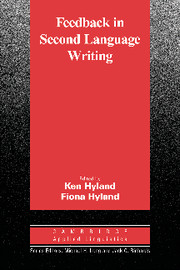Book contents
- Frontmatter
- Contents
- Contributors
- Series editors' preface
- Preface
- Chapter 1 Contexts and issues in feedback on L2 writing: An introduction
- I SITUATING FEEDBACK: SOCIOCULTURAL DIMENSIONS
- II SHAPING FEEDBACK: DELIVERY AND FOCUS DIMENSIONS
- III NEGOTIATING FEEDBACK: INTERPERSONAL AND INTERACTIONAL DIMENSIONS
- Chapter 10 Feedback and revision in second language writing: Contextual, teacher, and student variables
- Chapter 11 Interpersonal aspects of response: Constructing and interpreting teacher written feedback
- Chapter 12 Formative interaction in electronic written exchanges: Fostering feedback dialogue
- Chapter 13 Scaffolded feedback: Tutorial conversations with advanced L2 writers
- Chapter 14 “You cannot ignore”: L2 graduate students' response to discipline-based written feedback
- Author index
- Subject index
Chapter 14 - “You cannot ignore”: L2 graduate students' response to discipline-based written feedback
Published online by Cambridge University Press: 05 October 2012
- Frontmatter
- Contents
- Contributors
- Series editors' preface
- Preface
- Chapter 1 Contexts and issues in feedback on L2 writing: An introduction
- I SITUATING FEEDBACK: SOCIOCULTURAL DIMENSIONS
- II SHAPING FEEDBACK: DELIVERY AND FOCUS DIMENSIONS
- III NEGOTIATING FEEDBACK: INTERPERSONAL AND INTERACTIONAL DIMENSIONS
- Chapter 10 Feedback and revision in second language writing: Contextual, teacher, and student variables
- Chapter 11 Interpersonal aspects of response: Constructing and interpreting teacher written feedback
- Chapter 12 Formative interaction in electronic written exchanges: Fostering feedback dialogue
- Chapter 13 Scaffolded feedback: Tutorial conversations with advanced L2 writers
- Chapter 14 “You cannot ignore”: L2 graduate students' response to discipline-based written feedback
- Author index
- Subject index
Summary
Graduate students studying in a second language may find themselves knowing a great deal about the subject matter they study, yet feeling much less in command of the writing skills required to display and to further develop that knowledge within their disciplines. Their awareness of this discrepancy may be painful or embarrassing as well as frustrating (Braine, 2002; Cho, 2004; Hirvela & Belcher, 2001; Ivanic & Camps, 2001; Schneider & Fujishima, 1995; Silva, 1992). Some L2 graduate students, particularly science and technology students, may not only be writing in English for the first time but also writing for the first time at all at any length (Dong, 1998). Furthermore, these L2 graduate students may find themselves called upon to write sophisticated disciplinespecific texts, including theses and dissertations, with the curricular aid of only elementary and general-focus L2 writing courses (Hansen, 2000). The difficulty these students face is exacerbated by the fact that literacy requirements at the graduate level in disciplinary courses are often implicit (Carson, 2001; Raymond & Parks, 2002). How do they learn the genres, disciplinary language, and discourse conventions for papers in graduate courses, articles for publication (sometimes in collaboration with advisors), and theses and dissertations?
One formative aspect of graduate literacy education is feedback on writing, as clearly exemplified in L1 by Berkenkotter, Huckin, and Ackermann's study (1988) of a graduate student's development of expertise in a discipline's written genres.
- Type
- Chapter
- Information
- Feedback in Second Language WritingContexts and Issues, pp. 266 - 286Publisher: Cambridge University PressPrint publication year: 2006
- 19
- Cited by

